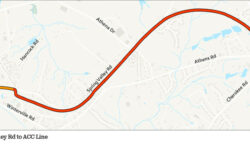If your toilet is broken and your landlord won’t fix it, what do you do? A presentation organized by the Athens-Clarke County Housing and Community Development Department at the ACC Library Apr. 6 focused on landlords’ and tenants’ responsibilities. Chad McCranie, senior counsel at Georgia Legal Services, said landlords are legally obligated to make repairs in a “reasonable” amount of time, but the law is vague about how quickly they must do so.
“There isn’t a set amount of time in the code as far as what’s reasonable,” McCranie said. “That’s up to a judge.” For something serious like a sewage leak, it might be three days; for something minor, it might be 15–30 days, said John Spagna, head of the ACC Code Enforcement Division.
“The first thing our officers tell everyone is, please don’t stop paying your rent,” Spagna said. “That’s not going to help you.”
Other options include making the repairs yourself and deducting the cost from rent, or suing the landlord in small-claims court for the cost of repairs. The latter is the safest option, McCranie said, but also the hardest.
Spagna urged renters to call code enforcement if they can’t get their landlord to fix something. Code enforcement officers can ticket property managers, but usually prefer not to because Municipal Court moves slowly. “We’d rather resolve the issue so you can get back to living your life than anything else,” Spagna said.
Eviction proceedings, however, move quickly—landlords must give tenants 60 days’ notice, a hearing is usually held within a week, and if the landlord wins, the sheriff can evict a week after the hearing. Reasons can include nonpayment of rent or breaching the lease.
In defending against an eviction notice, tenants can pay the back rent, point to a history of partial payments, provide documentation that they were discriminated against, or argue that the landlord failed to make repairs or is retaliating against a request for repairs, McCranie said. “Constructive eviction”—locking out the tenant or making the dwelling uninhabitable—is illegal in Georgia.
Overall, though, the system is stacked against renters, according to McCranie. “I think the judges, particularly in Clarke [County], are fair,” he said. “I think the law itself tends to favor landlords.
Like what you just read? Support Flagpole by making a donation today. Every dollar you give helps fund our ongoing mission to provide Athens with quality, independent journalism.









